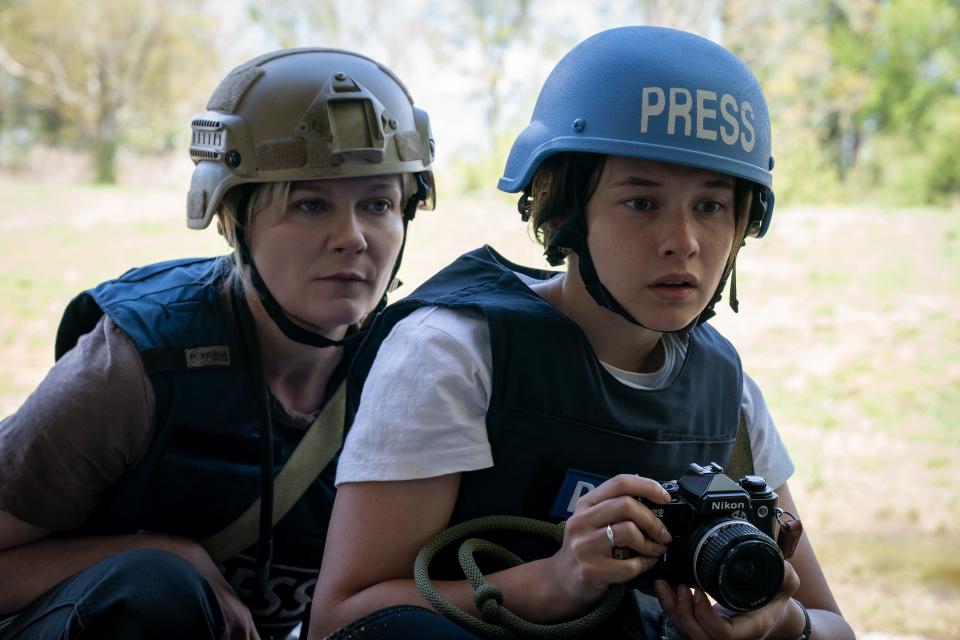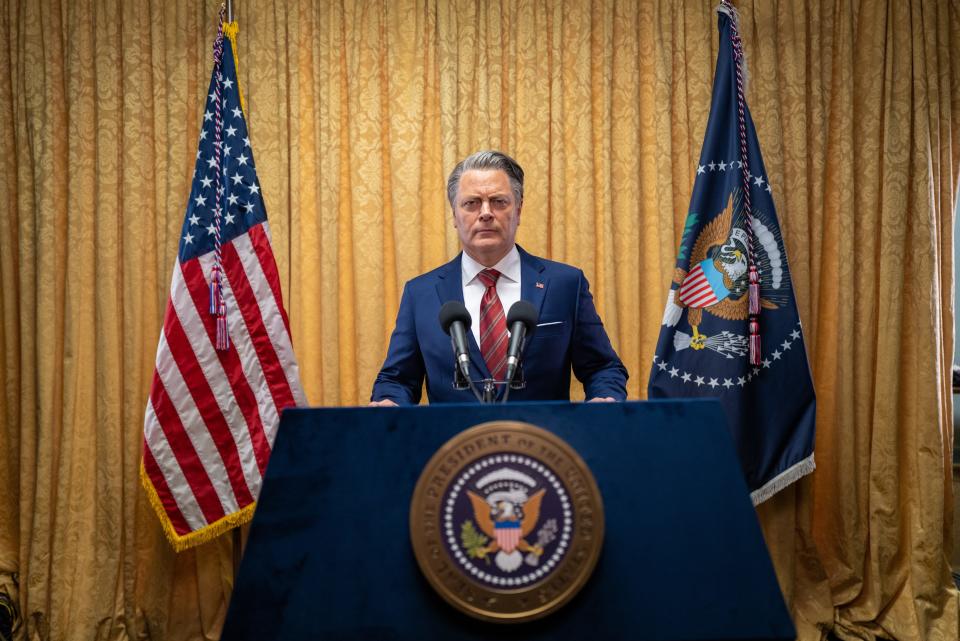'Civil War' review: Kirsten Dunst leads visceral look at consequences of a divided America
We see “Civil War” trending on social media all too commonly in our divided country, for one reason or another, and usually nodding to extreme cultural or ideological differences. With his riveting new action thriller of the same name, writer/director Alex Garland delivers a riveting cautionary tale that forces viewers to confront its terrifying real-life consequences.
“Civil War” (★★★? out of four; rated R; in theaters Friday) imagines a near-future America that’s dystopian in vision but still realistic enough to be eerily unnerving. It's a grounded, well-acted ode to the power of journalism and a thought-provoking, visceral fireball of an anti-war movie.
Played exceptionally by Kirsten Dunst, Lee is an acclaimed war photographer covering a fractured America: The Western Forces led by California and Texas have seceded from the USA and are days away from a final siege on the federal government. Lee and her reporting partner Joel (Wagner Moura) have been tasked with traveling from New York City to Washington to interview the president (Nick Offerman) before the White House falls.

After visually capturing humanity's worst moments, Lee is as world-weary and jaded as one can be. But after saving aspiring photographer Jessie (Cailee Spaeny) during a Brooklyn suicide bombing, Lee becomes a reluctant mentor as the young woman worms her way into their crew. Also in the press van: senior journalist Sammy (Stephen McKinley Henderson), hitching a ride to the Western Forces military base in Charlottesville, Virginia.
Most of “Civil War” is an episodic odyssey where Lee and company view the mighty toll taken by this conflict: the graveyard of cars on what’s left of I-95, for example, or how an innocent-looking holiday stop turns deadly courtesy of an unseen shooter. Primarily, however, it’s a disturbing internal examination of what happens when we turn on each other, when weekend warriors take up arms against trained soldiers, or armed neighbors are given a way to do bad things to people they just don’t like.
'No dark dialogue!': Kirsten Dunst says 5-year-old son helped her run lines for 'Civil War'

Given its polarizing nature, “Civil War" is actually not that "political." Garland doesn’t explain what led to the secession or much of the historical backstory, and even Offerman’s president isn’t onscreen enough to dig into any real-life inspirations, outside of some faux bluster in the face of certain defeat. (He’s apparently in his third term and dismantled the FBI, so probably not a big Constitutionalist.)
Rather than two hours of pointing fingers, Garland is more interested in depicting the effect of a civil war rather than the cause. As one sniper points out in a moment when Lee and Joel are trying not to die, when someone’s shooting a gun at you, it doesn’t matter what side you’re on or who’s good and who's bad.
The director’s intellectual filmography has explored everything from ecological issues (“Annihilation”) to AI advancement (“Ex Machina”), and there are all sorts of heady themes at play in “Civil War.” “What kind of American are you?” asks a racist soldier played with a steady, ruthless cruelty by Jesse Plemons (Dunst's husband) in a disturbing scene that nods to an even deeper conflict in society than the one torching this fictionalized version. There's also an underlying sense of apathy that the characters face, with hints that much of the country is just willfully ignoring the conflict because they'd rather not think about it. But this hellish road trip also maintains a sense of hopefulness ? via the growing relationship between Lee and Jessie – and is pretty exciting even with its multitude of horrors.
'You get paid a lot of money': Kirsten Dunst says she's open for another superhero movie
“Civil War” is a thoughtful movie with blockbuster ambitions, and while it does embrace more of a straightforward action flick vibe toward its climactic end, Garland still lands a lasting gut punch. He immerses audiences in the unpredictable nature of war, with gunfire and explosions leaving even the calmest sort on edge, and paints a sprawling canvas of an America forever changed. Thankfully, it’s just a warning and not a promise, using the movie theater as a public service announcement rather than an escape from the real world.
This article originally appeared on USA TODAY: 'Civil War' 2024 movie review: Alex Garland depicts a divided America
